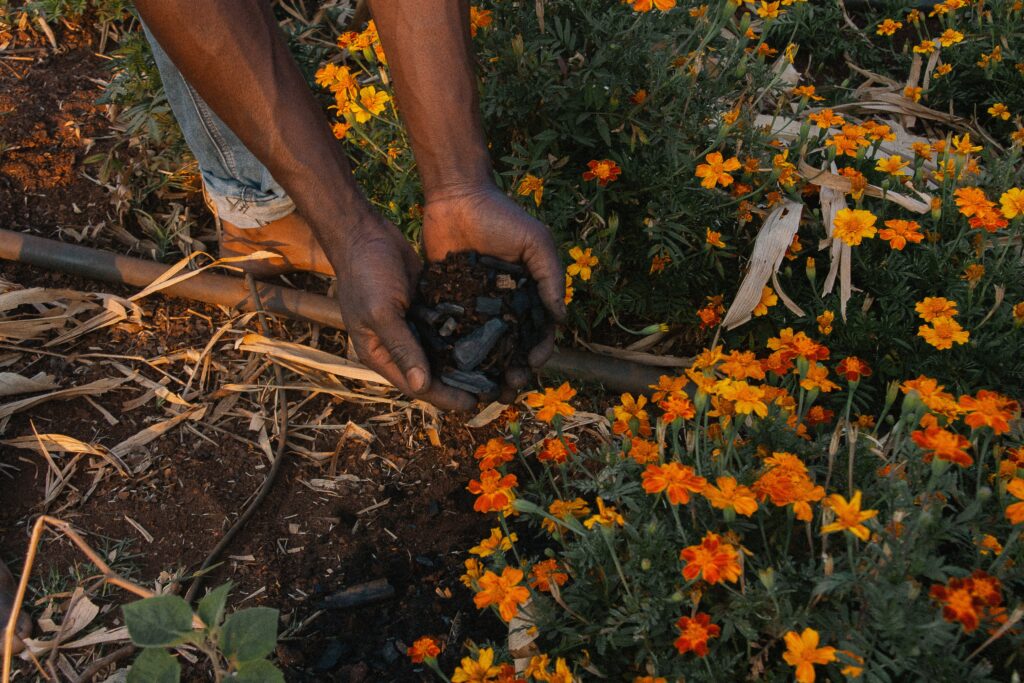

Better Cotton, the world’s largest cotton sustainability initiative, has teamed up with climate technology startup Planboo to help cotton farmers reduce greenhouse gas (GHG) emissions – and earn carbon credits for it.
The partnership will involve biochar, a charcoal-like substance made from agricultural waste and other waste products that, when applied to soils, can improve their health, while helping them store carbon for more than a century.
Biochar is known to improve the structure of soil and enhance its ability to retain water and nutrients, while limiting chemical fertiliser use. In collaboration with Planboo, Better Cotton will support licensed farmers to produce this topical solution from farm waste and later apply it on the ground – providing environmental benefits in both phases.
Lars van Doremalen, Director of Impact at Better Cotton, said: “Planboo has championed biochar for over half a decade, and it is easy to see why. This age-old practice creates value from waste and boosts the climate resilience of land. Add to that the scope for farmers to be financially rewarded for their sustainability efforts, and this is an incredibly exciting proposition.”
Better Cotton will leverage Planboo’s digital Measurement, Reporting, and Verification (MRVin) system throughout this work, capturing data points from the production of biochar to the calculation of carbon reductions and removals.
This end-to-end software synchronises data to accurately calculate waste inputs, biochar volumes, carbon removals, and subsequent carbon allocation. As such, it unlocks new income streams for communities committed to reducing carbon emissions and improving their soil health.
Retailers and brands can also benefit, as their support to scale these efforts within the value chain would help mitigate Scope 3 emissions, which account for the vast majority of greenhouse gas release by the fashion and textile industries.
Freddie Catlow, Co-founder & CEO said: “From our very first days, Better Cotton stood out as the partner to deliver impact within fashion value chains. After seeing a 60% yield increase in cotton crops from our Solidaridad project in Zambia, it became clear this model was well-suited for cotton farming regions.
“With Better Cotton’s global reach and Planboo’s digital MRVin, we’re excited to embed carbon removal and soil health into the fabric of cotton farming, rooted in regeneration, and scaled by software.”
Better Cotton and Planboo will soon provide details of the scope of their first project, targeting smallholder cotton farming communities in India.
Notes to Editors
- Biochar has been used by farmers for thousands of years to improve the health of soil and its resilience to extreme weather conditions.
- In addition to agricultural waste, biochar can also be produced using forestry residues, garden waste, wood chips, manure, food waste, and other plant-based materials.
- Biochar is applied close to the plant root to maximise its effectiveness in retaining moisture and nutrients that aid growth.
- Planboo has co-developed projects across coffee, cotton and cacao value chains across seven countries.
- A company’s Scope 3 emissions are indirectly produced throughout the supply chain, from raw material extraction and transport, among other things.
- The Fashion Industry Charter for Climate Action estimates a company’s Scope 3 emission to be approximately 99% of the full footprint, compared to 1% from its own operations.
- Carbon reductions and removals through field-level projects will support retailers and brands in achieving sustainability targets approved by the Science Based Targets initiative (SBTi).
Planboo is a climate tech company based in Stockholm that provides the tools, technology, and training to support high-quality biochar carbon removal across the Tropics. From helping develop projects and tracking carbon removals to connecting them with impact-driven buyers, Planboo’s digital MRV platform, MRVin™, ensures transparency, trust, and real-world accountability. In 2024, Planboo was sixth in the world for removing carbon dioxide from the atmosphere, all by turning agricultural waste like cacao, coffee, and cotton residues into stable carbon biochar, while increasing the incomes of farmers in tropical regions.







































